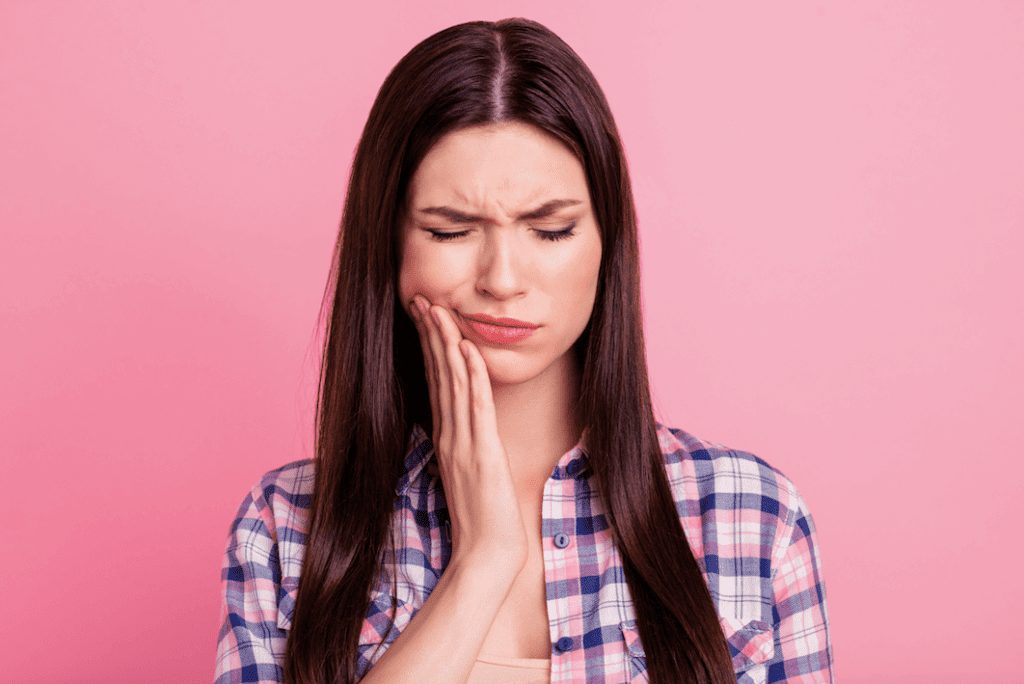Do you clench or grind your teeth when stressed?
Bruxism is a condition defined by teeth clenching and grinding. Teeth grinding has become one of our dental office’s most common dental concerns. Many patients may not even know they have bruxism, as it can occur unconsciously during sleep. Dr. Ben Ahlbrecht and his team treat patients with teeth clenching and grinding in Indianapolis, IN.
They work with patients to find the best solution that fits their particular needs. Know the signs of bruxism and learn how we treat the condition below.

Common Signs of Teeth Grinding & Bruxism
This dental concern often appears through these multiple symptoms:
- Jaw pain
- Worn teeth
- Muscle tenderness
- Chronic facial pain
- Headaches
- Increased tooth sensitivity
Have you noticed any of these signs? Call our office at 317-204-7134. Some risk factors for developing bruxism include crooked, misaligned teeth and TMJ disorders. It is important to treat bruxism early before teeth are severely damaged. Teeth may crack due to the pressure that is exerted when clenching and grinding teeth.
How To Treat Teeth Grinding & Bruxism
Prior to treatment, Dr. Ahlbrecht will assess your teeth to take note of any sites of damage. He offers oral appliance therapy that utilizes night guards, or other oral appliances, that are custom-made for each patient. These night guards can be worn at night or during stressful situations to prevent tooth damage. They take the pressure off of the jaw and relieve the pain caused by bruxism.
Some patients may need restorative or cosmetic solutions following night guard treatment. Crooked teeth can be treated with Invisalign and restorative dental treatments. Dental crowns and dental implants may be utilized for patients with severe tooth damage or loss. Other more minor treatments used in tandem with oral appliances include ice packs, anti-inflammatory and anti-anxiety medications, and jaw stretching exercises.
Teeth Grinding FAQs
Teeth grinding can seriously damage your teeth. Read the answers to these questions and learn more.
Is teeth grinding harmful?
Chronic teeth grinding can cause serious dental problems, including tooth fractures, enamel erosion, and even tooth loss. It can also lead to temporomandibular joint (TMJ) disorders, causing chronic pain and difficulty chewing. Severe cases may require dental work like crowns, veneers, or orthodontic treatment to correct the damage. Early intervention can help prevent these complications.
How can I tell if I grind my teeth at night?
Many people are unaware they grind their teeth at night because it happens while they sleep. However, signs such as waking up with jaw pain, headaches, or sensitive teeth may indicate nighttime grinding. We can examine your teeth for signs of wear and damage. Some people use sleep studies or special monitoring devices to confirm sleep bruxism.
Does diet affect teeth grinding?
Yes, certain foods and drinks can contribute to bruxism. Caffeine, alcohol, and sugar can increase muscle tension and stimulate jaw activity, making grinding worse. Staying hydrated and maintaining a balanced diet with magnesium-rich foods may help relax muscles and reduce grinding. Avoiding gum chewing can also prevent excessive strain on the jaw.
Can stress and anxiety cause teeth grinding?
Yes, stress and anxiety are major contributors to bruxism, especially in awake bruxism. People who experience high stress levels may clench their jaw or grind their teeth without realizing it. Relaxation techniques, such as meditation, breathing exercises, or counseling, can help reduce stress-related grinding. If anxiety is severe, a doctor or therapist may recommend professional treatment options.
Can exercise help with teeth grinding?
Yes, regular exercise can help reduce stress-related teeth grinding. Yoga, meditation, and stretching can relax the jaw muscles and decrease tension. Jaw exercises, such as gently stretching and massaging the jaw area, can relieve muscle tightness. If grinding is due to stress, finding ways to relax can make a big difference.
Can teeth grinding be cured?
There is no single cure for bruxism, but various treatments can help manage and reduce symptoms. Wearing a custom mouthguard, reducing stress, and addressing any underlying medical conditions can significantly reduce grinding. Behavioral therapies and lifestyle changes, such as avoiding caffeine and alcohol, can also help. For severe cases, orthodontic treatment or Botox injections may be considered.
Stop Jaw Pain Today at North Meridian Dental Excellence
Address your bruxism at the source with comprehensive professional treatment. Call our dentist in Indianapolis, IN, at 317-204-7134. You can also request an appointment with one of our dentists. We are dedicated to performing high-quality dental care of the highest standard. Feel free to ask any further questions you may have about our services to a member of our staff. They will be happy to answer them for you.
